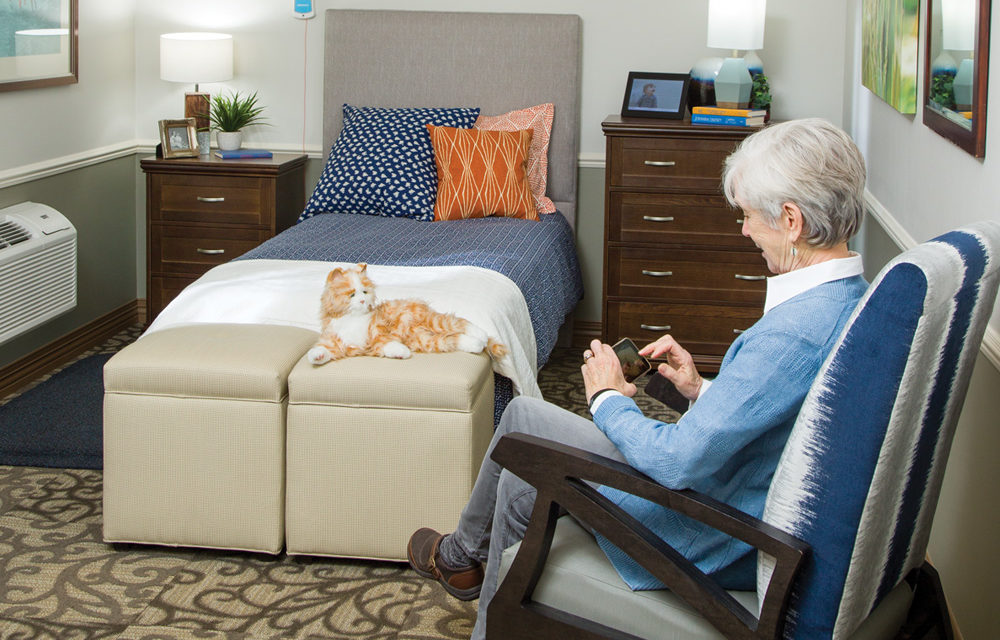The Sanctuary Senior Charlotte: Personalized Senior Living Solutions
The Sanctuary Senior Charlotte: Personalized Senior Living Solutions
Blog Article
Discovering the Comprehensive Conveniences of Memory Care Facilities for Elders With Dementia and Alzheimer's
Memory care facilities have emerged as vital resources for seniors grappling with mental deterioration and Alzheimer's, using a range of tailored services that address both their physical and psychological requirements. These environments not only guarantee safety and safety and security yet also provide personalized treatment strategies and appealing activities developed to enhance cognitive feature.
Safe and Secure Environment
Developing a safe and safe and secure environment is extremely important in memory treatment centers, as it directly impacts the health and convenience of residents. Individuals with mental deterioration and Alzheimer's disease usually experience confusion and disorientation, making security functions important in these setups. Facilities should be created to lessen risks, incorporating attributes such as non-slip flooring, handrails, and ample illumination to avoid drops and crashes.
The layout of memory care centers must facilitate very easy navigation while preventing roaming, a common behavior among locals. Encased gardens and safe outdoor rooms offer possibilities for risk-free expedition and engagement with nature, fostering a sense of freedom. Furthermore, team training in emergency treatments and crisis monitoring is essential to make sure that all employees can react properly to any type of scenario.
Furthermore, security systems and controlled accessibility factors add to a feeling of protection for both locals and their family members. Open up interaction with family members about security methods improves trust and assurance. Eventually, an attentively designed atmosphere not just safeguards homeowners but likewise promotes self-respect and lifestyle, allowing individuals with memory disabilities to prosper in an encouraging atmosphere.
Personalized Care Program
Individualized care strategies are necessary in memory care facilities, as they satisfy the one-of-a-kind requirements and choices of each homeowner. These plans are carefully established in cooperation with family members, healthcare experts, and the citizens themselves, making sure that every specific obtains customized support.
The procedure begins with a thorough evaluation that evaluates the citizen's case history, cognitive abilities, and psychological well-being. This analysis assists identify certain challenges connected to mental deterioration or Alzheimer's, permitting targeted treatments. Customized care plans often resolve daily living tasks, medication monitoring, social interaction, and dietary needs, creating a holistic strategy to care.
Furthermore, these strategies are dynamic; they are consistently assessed and readjusted to show any kind of changes in the local's condition or preferences. This adaptability is essential, as dementia symptoms can rise and fall, requiring adaptations in treatment techniques. By focusing on the private instead of a one-size-fits-all strategy, memory care centers can improve the lifestyle for locals, promoting self-respect and self-reliance.
Engaging Tasks and Programs
Involvement is an important element of memory treatment, as it promotes cognitive stimulation and psychological wellness amongst senior view citizens. Memory Care charlotte. Memory treatment centers use a variety of interesting activities and programs tailored to the special demands and abilities of individuals coping with dementia and Alzheimer's. These activities are designed to stimulate the mind, promote reminiscence, and boost daily living skills
Programs might include arts and crafts, songs treatment, gardening, and sensory tasks, which not only supply enjoyment however additionally assist maintain cognitive function. Structured regimens and deliberate activities can decrease anxiousness this link and complication, producing a feeling of normalcy and structure for homeowners.
In addition, centers usually integrate life enrichment programs that urge citizens to join thinking back activities, such as sharing tales or looking at picture cds. This approach not only sustains memory recall yet also strengthens individuality and dignity.
In addition, specialized cognitive video games and puzzles can assist keep imagination, while reference physical activities promote total health and wellness and health. By cultivating a setting rich in engaging activities, memory care centers play a crucial duty in improving the lifestyle for elders encountering cognitive challenges.
Social Interaction Opportunities
Social interaction opportunities are essential to the general health of senior citizens in memory care centers. These environments are developed to promote significant connections among citizens, which can substantially boost their top quality of life. Involving with peers assists to minimize feelings of solitude and seclusion commonly experienced by people with mental deterioration and Alzheimer's illness.
Memory treatment facilities commonly assist in group tasks, such as art courses, music treatment, and social games, which encourage homeowners to interact and work together. These tasks not just promote cognitive engagement yet likewise nurture crucial social abilities, thus boosting psychological health and wellness. The existence of skilled employee better improves these interactions, as they are knowledgeable in assisting in conversations and ensuring that all homeowners really feel included.

Support for Families
Families of senior citizens in memory care facilities commonly encounter significant psychological and logistical challenges as they browse the intricacies of their liked ones' problems. The transition to a memory care center can stimulate feelings of shame, unhappiness, and stress and anxiety, prompting family members to look for assistance systems that can alleviate their burdens.
Memory treatment facilities identify the significance of family members participation and supply different resources to sustain them. Regular household meetings and care conferences are conducted to keep family members educated concerning their liked one's development and care strategies. These interactions cultivate a joint environment where families can reveal problems, ask questions, and share understandings concerning their liked ones' preferences.
Moreover, several facilities supply academic workshops and support groups designed to help family members recognize dementia and Alzheimer's disease much better. These programs furnish household members with coping techniques and devices to manage the psychological chaos that frequently accompanies caregiving.
In enhancement, break treatment solutions are offered, allowing family members to take required breaks while guaranteeing their liked ones receive top quality care. Completely, these extensive assistance systems empower families, assisting them to cope a lot more efficiently with the obstacles that occur throughout this challenging trip.

Final Thought
In conclusion, memory care centers give essential assistance for elders with mental deterioration and Alzheimer's with a variety of extensive benefits. The risk-free and secure environment, paired with personalized care strategies and appealing activities, fosters cognitive stimulation and emotional well-being.
Report this page